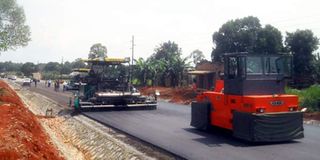Oil gives Bunyoro a new lease of life

Hoima-Kaiso-Tonya road that is being upgraded from marram to tarmac. Many other infrastructures are being developed as a result of the discovery of oil in the region PHOTO BY Francis Mugerwa.
What you need to know:
A few years ago, Bunyoro always complained that government had left it behind as far as economic and infrastructural development was concerned. However, with the discovery of oil in the region, the music tunes have changed.
Hoima
Bunyoro has for many decades complained about alleged marginalisation. The kingdom and its subjects have on several occasions pointed accusing fingers at government for allegedly failing to address the colonial injustices the region suffers to date.
The kingdom claims the British colonialists did not develop the infrastructure as a punishment for Omukama Kabalega’s resistance against imperialism. And in this light, the recent infrastructural developments seem to be opening a new chapter in the mineral-rich mid-western region.
The oil blessings
President Museveni commissioned the construction of a 600 Megawatt Karuma Hydro Power Dam this month. The project, which is expected to be completed within five years, is the latest multi-million project that the region has obtained since commercially viable oil deposits were discovered on the shores of Lake Albert.
In February, the President commissioned the 9 Megawatt Kabalega hydro power project on River Wambabya in Hoima District. The dam worth $38.8 million (about Shs100b) was named after an ancient Bunyoro king in recognition of his attempts to safeguard the sovereignty of his kingdom and preserve Africa’s independence. The construction of a 92-Km Hoima-Kaiso-Tonya road is already under way.
The road, which is being upgraded from marram to tarmac, is expected to be completed in 2014.
Government has also gazetted a 29 square kilometer piece of land in Kabaale parish, Hoima District where it intends to set up an oil refinery.
The Bunyoro Affairs State Minister, Mr Ernest Kiiza, says such projects are a priority of the government.
The challenge, however, is for all leaders and residents to use the infrastructure to transform livelihoods in a region where poverty is prevalent. “As a region, we must position ourselves strategically to benefit from the oil discovered in the Albertine region and the opportunities that have come as a result of the (oil) industry,” Mr Kiiza said.
The oil curse
Oil-related developments have attracted many emigrants, investors and speculators into Bunyoro.
Whereas some are seeking jobs and business opportunities out of the budding oil industry, local leaders say authorities are feeling the impact of the population pressure on existing infrastructure.
The Hoima District vice chairperson, Mr Fred Kakoraki, has urged the government to expedite the physical planning process of the Albertine grabben to guide structural developments of towns and settlements.
“Hoima requires an updated physical plan to match the mushrooming developments. The government should think ahead of us and expand roads that are currently narrow to accommodate wide oil trucks,” Kakoraki, who is also the Hoima District secretary for works, said.
The chairman of Bunyoro Local Oil and Gas Advocacy Group (BULOGA), an indigenous pressure group, Mr Jackson Wabyoona, said for those people whose life depends on Lake Albert for fishing, grazing and collecting firewood from within grasslands where oil developments are being undertaken, life is becoming a night mare. “The monetary and cash economic system that is growing along the lakeshore communities has not benefited everyone more especially the unprepared and less responsive to new economic challenges and developments,” Wabyoona said.
He said land price-offers are so tempting to the poor that they cannot resist selling their land and yet such people have no investment plans for such monies which all go to waste and leaving such people in abject poverty.
More needs to be done, Bunyoro officials say
Despite the infrastructure that the region has attained since the oil discovery, Bunyoro Kingdom believes a lot needs to be done to address the historical factors that have crippled development in the region. The Omukama’s press secretary, Mr Henry Ford Mirima, said there is need for a deliberate programme to enable the Banyoro to attain land titles for their ancestral land where many of them live as squatters. “The roads leading to oil fields are meant to help government and oil companies to access oil. But our major demand is government to address the Bunyoro land question. The land titles give security of ownership and can be used as mortgage in financial institutions to secure loans for investment,” Mirima said.
Mr Mirima said it is unacceptable for the Banyoro to be squatters on their mineral-rich land. He wondered why government has not implemented the various commission of inquiry reports that have, among others, recommended that the government conducts a systematic survey and demarcation of Bunyoro’s land to enable the kingdom and its subjects to access land titles.
He also observes that lack of a public university in the region is affecting education standards since many students who do not afford costs associated with tertiary education drop out and fail to attain the desired skills. His position is also echoed by the Bunyoro Kingdom’s prime minister, the Rev Jackson Nsamba Kasozi, who believes that Bunyoro requires an affirmative action to improve on agriculture, health, education and household incomes.
The executive director of Global Rights Alert, an NGO involved in oil advocacy, Ms Winnie Ngabiirwe, said whereas the oil related developments have positive impacts on economic growth and transformation, they should be undertaken taking into account of the rights of the communities.
Ms Ngabiirwe said compensations for people who lose properties in such developments needs to be fair, adequate, timely and done within the Ugandan laws and international best practices. “The oil developments should not disrupt the livelihoods of women, marginalised and vulnerable groups. Efforts should be undertaken to enhance the livelihoods of the oil hosting communities so that they co-exist with oil and reap benefits of economic growth,” Ngabiirwe said.




